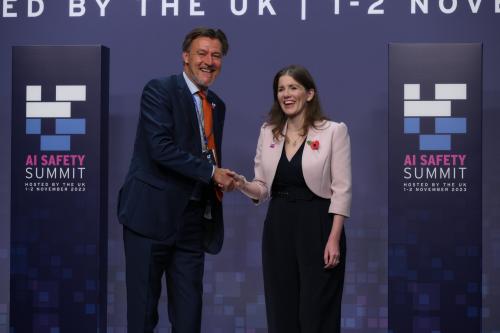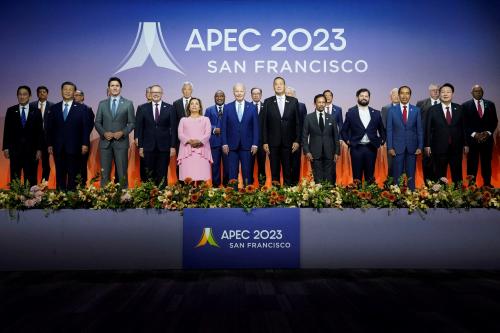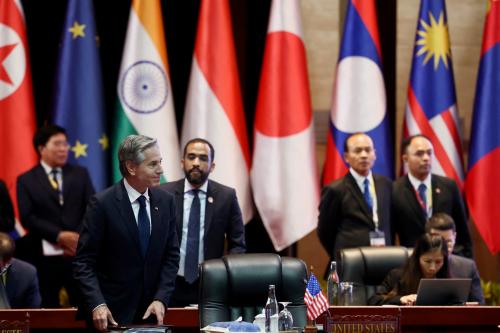Ukraine has ordered all of its troops out of Crimea even as Russian forces stage incursions into Ukrainian military facilities there. And President Obama is in Europe this week for a long-planned trip, but is now also meeting with G-7 leaders. Brookings experts continue to offer commentary and recommendations on the unfolding challenges. See previous editions of this roundup here, here, and here.
[Putin is] not delusional, but he’s inhabiting a Russia of the past—a version of the past that he has created. His present is defined by it and there is no coherent vision of the future. Where exactly does he go from here beyond reasserting and regaining influence over territories and people? Then what?”
—Fiona Hill, top intelligence officer on Russia during George W. Bush administration and co-author of Mr. Putin: Operative in the Kremlin, to the New York Times
Brookings President Strobe Talbott, former U.S. deputy secretary of state during the Clinton administration and a key player in the early post-Soviet era, appeared on CNN’s “Amanpour” program with Andrei Kozyrev, the first post-Soviet Russian foreign minister. Talbott said that Vladimir Putin “has been making this up as he goes along.” Talbott continued:
We shouldn’t talk about the possibility in the future of Putin going further than just Crimea. He is already going further than just in Crimea. Now that doesn’t mean he’s actually formally moved in, annexed territory, had an overt invasion. But through all kinds of assets that Russia has inside of Ukraine he is doing everything he can to shake the situation up, destabilize the country so that he can have more leverage over what happens next.
And he’s also moving on other parts of the periphery of the Russian federation, particularly Transnistria which is a situation, although not very well known yet, it will become better known in the weeks to come, a situation very much like that of Crimea only it’s in the country of Moldova. …
President Obama’s challenge in Europe which he has already begun to address, is to maximize the coherence, the solidarity, the unitedness of the transatlantic community and to the extent possible the international community so there will not be a temptation, an ability for President Putin to play the allies off against one other.
Watch below:
Steven Pifer
, senior fellow and a former U.S. ambassador to Ukraine,
counters some recent commentary that compares
President Obama’s response to the Crimea crisis unfavorably to President George W. Bush’s response to Russia’s invasion of Georgia in 2008:
In a brief, five-day conflict, the Russian army routed its outnumbered and outgunned Georgian opponent and advanced to within a short drive of the Georgian capital, Tbilisi. Bush officials ruled out military options and found that, given the deterioration in U.S.-Russian relations over the previous five years, they had few good levers to influence the Kremlin. The sanctions Washington applied at the time had little resonance in Moscow.
“Those who faced the challenge of punishing Russia over Georgia,” Pifer concludes, “should understand the complexities of dealing with Putin and, at a minimum, cut the current administration a little slack.”
Read the full piece on POLITICO here.
Strobe Talbott was, in June 1999, deputy U.S. secretary of state and led a team of U.S. officials to coordinate plans for an international peacekeeping force in Kosovo, to include Russian troops under U.S. command. He recounts that episode and meeting Vladimir Putin for the first time, when Russian military forces seemed to be about to open a wider conflict in Kosovo. As Talbott writes of Putin:
Putin’s role in that narrowly avoided military collision 15 years ago remains a mystery, but his attitude was clear then and relevant today. During a dangerous power vacuum in Moscow — when partnership between Russia and the West was at the breaking point; when Russian armed forces, fed up with having to make nice with NATO, took matters into their own hands and tried to rush to the aid of fellow Slavs — Yeltsin’s soon-to-be handpicked successor seemed to be relishing the moment.
Read more at Washingtonpost.com.
Bruce Jones, author of Still Ours to Lead: America, Rising Powers, and the Tension Between Rivalry and Restraint (Brookings, 2014), was asked by KTLA News (Los Angeles) how this crisis affects American citizens. Jones replied:
Russia’s actions, the attempt reverse Crimea’s status by force, really threaten a lot of our allies in Eastern Europe, and I think it’s very important that the United States stand behind our allies. … The first round [of sanctions] were more symbolic; this round is really going after key financial institutions and people close to Putin. And these will have an effect over time; they’re not going to reverse Russia’s actions tomorrow but they will weaken the Russian economy over time.
Ukraine needs U.S. financial and political support, Jones said:
We’re not going to invade militarily … this is not a NATO ally. We can use sanctions. We can support the government of Ukraine; that’s going to be a long, hard slog. This is not a well-managed government. We’re going to have to give it financial support but also political support and try to urge it to do serious reforms if Ukraine is going to stand up on its own and tilt toward Europe which is what we want to see here. …
We hear a lot about American decline and the rise of these new powers and the kind of resurgence of Russia. But the fact is, if you look at the fundamentals, the United States is an enduring power and it’s by far and away the most influential actor on the world stage. It’s really a question of how we choose to lead and whether or not we put the will and the muscle behind our leadership.
Can any personal relationship between Presidents Obama and Putin be brought to bear?
No. … But it’s not about the relationship. It’s about whether or not the United States shows that it’s going to be willing to stand up to the Russians and impose costs if the Russians continue to act the way they have. We can’t stop them from doing certain things. We can make it much more costly for them.
Watch the complete interview on KTLA.
Jeremy Shapiro, a visiting fellow in Foreign Policy, speaking to the Los Angeles Times yesterday on the eve of President Obama’s trip to Europe this week, observed that:
Once, or if, the dust settles on the military moves that we’ve seen in recent weeks, history will evaluate the wisdom of Russia’s actions in Crimea, based to a large degree on how Ukraine does, the rest of Ukraine does, over the next few years. It will not be easy to set Ukraine on a good political and economic path given recent Ukrainian experience. I think the U.S. and Europe can play a big role.
Here is some of what Brookings scholars are saying on Twitter:
One thing that worries me in US response to Ukraine is under-estimating how hard it will be to achieve a successful Ukraine – even if …2
— Bruce Jones (@brucebrookings) March 24, 2014
… Russia doesn’t work hard to undermine it, which it will. Prosperous and democratic Ukraine is a long tough slog.
— Bruce Jones (@brucebrookings) March 24, 2014
My first encounter with Putin over Kosovo 15 yrs ago & why it comes to mind today. http://t.co/sfOX4FimM8
— Strobe Talbott (@strobetalbott) March 22, 2014
Given extent of Russian penetration of Ukraine, Kyiv gov has tough job vetting armed forces, honeycombed w/ pro-Moscow individuals & cells.
— Strobe Talbott (@strobetalbott) March 23, 2014
“@Anopov: @strobetalbott pic.twitter.com/fK1Mkevy1Q” – 3.0 will be a LOT smaller.
— Strobe Talbott (@strobetalbott) March 23, 2014
He is who he was. In Kremlin meeting years ago, a Westerner was billed as a friend of Russia’s. Putin snapped, “We have no friends there.”
— Strobe Talbott (@strobetalbott) March 23, 2014
What would Mr. X, George Kennan say about #Ukraine crisis: For compelling insight, worth reading this 1998 article. http://t.co/dP72p6ZCnl
— Shibley Telhami (@ShibleyTelhami) March 23, 2014
Inevitably as Obama heads to Europe, wags are saying the West is from Venus, Russia from Mars (pace @BrookingsFP‘s Bob Kagan). Putin agrees
— Strobe Talbott (@strobetalbott) March 23, 2014



Commentary
Brookings Scholars on the Ukraine/Crimea Crisis, 3/24/14
March 24, 2014